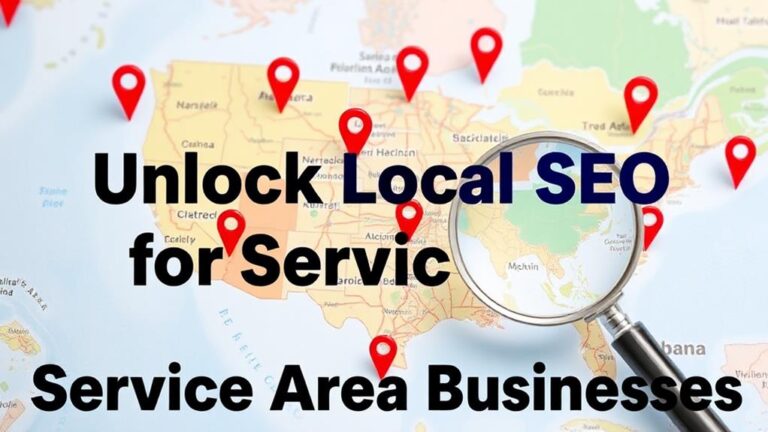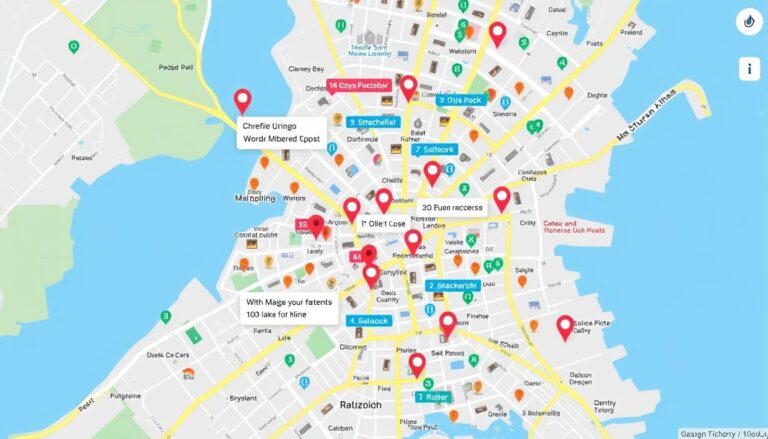Conducting a competitive analysis for local SEO helps you understand your market landscape and improve your online presence. Start by identifying businesses that rank for similar local keywords, using tools like BrightLocal for performance metrics. Analyze competitors' Google Business Profiles to uncover strengths and weaknesses. Pay attention to their keyword usage, customer reviews, and content updating strategies. Regularly monitor these competitors and adapt your SEO strategies based on your findings. Engaging with your local community can also enhance your visibility. There's plenty more to explore on this topic to strengthen your approach.
Importance of Competitive Analysis
Understanding the importance of competitive analysis in local SEO can greatly boost your online presence. By conducting a thorough competitive analysis, you can identify your top-ranking local competitors and uncover the effective strategies they use to achieve high visibility in local search engine results.
This insight allows you to develop a more effective local SEO strategy tailored to your specific market. Additionally, leveraging strategic intel from competitor insights can help refine your approach and enhance your overall visibility in local searches.
Analyzing your competitors' Google Business Profiles can reveal essential optimization practices, such as how they manage reviews and maintain profile completeness, both critical ranking factors.
You'll also gain clarity on their strengths and weaknesses, providing you with opportunities to enhance your own optimization strategy.
Through competitor research, you can determine the effort and tactics your local competitors employ to rank well. By examining their content gaps and optimization efforts, you can create a data-driven approach that positions your business favorably in local searches.
Ultimately, understanding competitive analysis helps you stay ahead of the game, ensuring your business enhances its search visibility and effectively responds to local market demands.
This proactive approach will empower you to outrank your competition over time.
Identifying Local Competitors
To effectively enhance your local SEO strategy, identifying your local competitors is a key step. Understanding who your local competitors are can greatly influence your local SEO success.
Start by researching businesses ranking for similar local keywords in Google Maps and organic search results. This analysis reveals not only who your direct competitors are but also strategic optimization opportunities that can set your business apart.
Here's how you can do it:
- Conduct Local Keyword Research: Use tools to find relevant search terms that potential customers are using. This can reveal competitors you mightn't see right away.
- Analyze Google Search Results: Perform Google searches with targeted keywords. Take note of competitors' visibility in Google Maps, local packs, and organic results.
- Examine Google Business Profiles (GBP): Look at competitors' GBPs to assess their categories, descriptions, and customer reviews. This offers insights into their local SEO strategies and customer engagement.
- Utilize Tools for Competitor Analysis: Use platforms like BrightLocal to generate reports that identify local competitors and their performance metrics, giving you an all-encompassing view of the competitive landscape.
Steps for Conducting Analysis
When you immerse yourself in competitive analysis for local SEO, it's important to follow a structured approach.
Start with local competitor analysis by evaluating the proximity of your business to competitors. Businesses closer to your target audience typically rank higher due to geographic relevance. Additionally, consider how your competitors manage their local citations, as this can greatly impact their search visibility and credibility.
Next, evaluate your competitors' Google Business Profiles. Look at their primary categories, reviews, and features like descriptions and photos to identify their strengths and weaknesses.
Then, analyze the on-page content of competitor websites. Focus on keyword usage, content quality, and engagement metrics. This helps you uncover the successful strategies they employ.
Don't forget to examine their backlink profiles and the impact of local citations; understanding their authority and trustworthiness is essential for your own ranking.
Lastly, regular monitoring of competitor performance is crucial. Keep an eye on any changes they make, adjusting your strategies accordingly to maintain your competitive edge in local SEO rankings.
Google Business Profile Optimization
Optimizing your Google Business Profile (GBP) can make a significant difference in your local search visibility. By focusing on essential elements, you can enhance your local SEO efforts and outperform competitors.
Here are four key strategies:
- Accurate Information: Confirm your business name, address, and primary category are correct. This is critical for local search visibility.
- Regular Updates: Keep your GBP fresh with new content, such as updated descriptions, engaging photos, and frequent posts. This helps improve your rankings in local search results.
- Leverage Reviews: High-quality reviews play an essential role in your GBP ranking. Implement a robust review management strategy to boost credibility and attract more local customers.
- Utilize Local Keywords: Incorporate relevant local keywords in your GBP description and posts. This enhances your visibility and relevance in search results tailored to your specific audience.
Engaging with your community through local content, like promoting events or special offers, can further increase your profile's visibility.
Tailoring Your SEO Strategies
After enhancing your Google Business Profile, the next step is to tailor your SEO strategies to fit the unique dynamics of your local marketplace. Start by conducting a thorough competitor analysis. Understand how your competitors approach local SEO and identify high-impact tasks that can boost your search visibility. This focused approach will help you prioritize efforts that matter most.
Next, adapt your strategies based on local consumer behavior and preferences. By aligning your efforts with audience expectations, you can greatly improve your conversion rates. Remember, the local market is always evolving, so continuous monitoring is essential. Regularly assess your SEO performance and make adjustments based on any changes you observe.
Don't underestimate the power of community engagement. Building relationships with local businesses and influencers can amplify your reach. Collaborating with them not only enhances your SEO strategy but also fosters a sense of community.
Conclusion
To sum up, conducting a competitive analysis for local SEO isn't just beneficial; it's essential for your business's growth. By understanding your local competitors and optimizing your Google Business Profile, you can tailor your strategies to stand out. Remember, success in local search isn't a coincidence; it's the result of informed decisions and smart tactics. So, immerse yourself, analyze your competition, and watch your visibility soar in the local market. Your efforts will pay off in attracting more customers.




